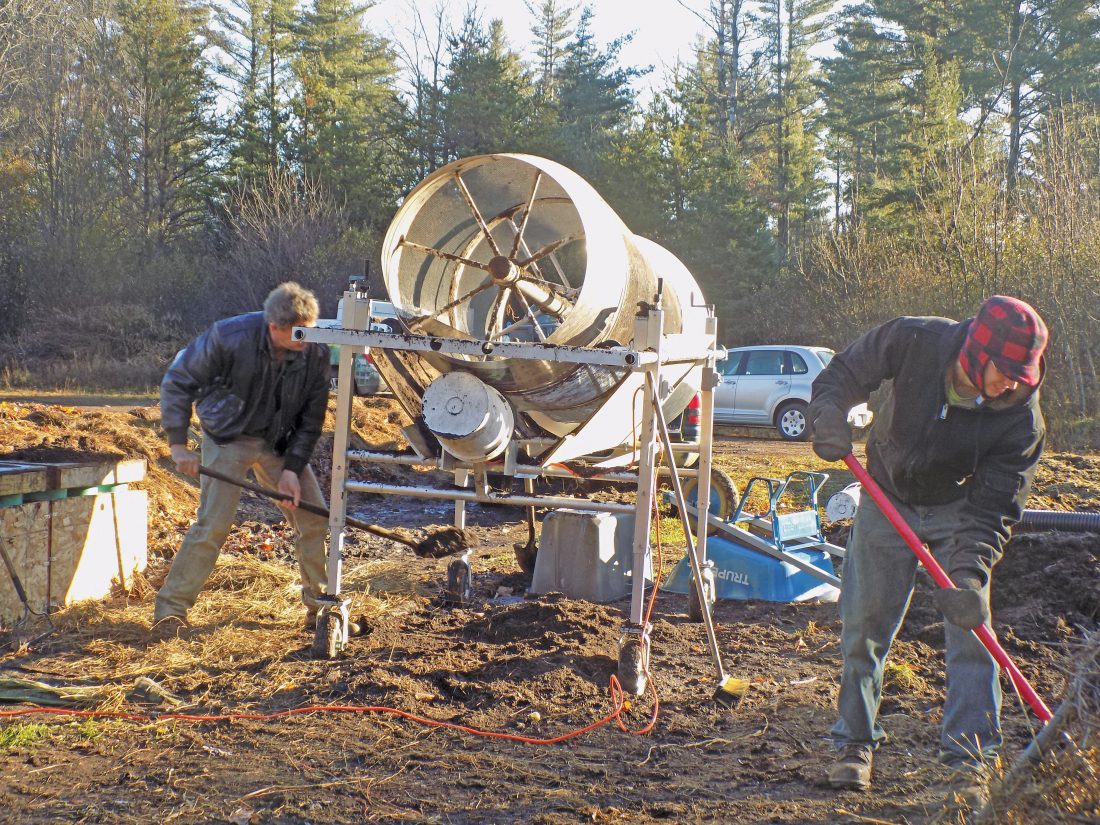Agricultural actions
Partridge Creek Farm working on multiple projects

Dan Perkins, left, owner of Perkins Construction and director of Partridge Creek Farm, and Aaren Joki, a subcontractor for Partridge Creek, work vermicompost at the Perkins Construction site. Vermicompost is a natural and valuable soil amendment, which is available at Partridge Creek. (Journal file photo by Christie Mastric)
ISHPEMING — As spring turns into summer, it could be said that Partridge Creek Farm continues “blossoming” with farm-community projects.
The farm recently received a Michigan Health Endowment Fund planning grant for a new career technical education program in agriculture at Ishpeming High School. The grant, in the amount of $86,000, will be used to conduct a community needs assessment, build curriculum and design infrastructure for the program.
The career technical education program will help Ishpeming High School seniors work toward an associate’s degree in agriculture, which would be granted once they have completed the program, Partridge Creek Farm Director Dan Perkins said.
“We want to become the educational hub of the Great Lakes region in the transition to sustainable regenerative and local food production,” he said. “…We are perfectly situated because we’ve got all the career technical (agriculture) people at (Marquette-Alger Regional Education Service Agency) and MiSTEM at (Northern Michigan University.) We’ve got just a great collaboration of people but we don’t have the entrenched monoculture (agriculture) program. So we can start something fresh.”
Beyond providing agricultural education, other goals for the project include creating accessible, healthy soil to sustain local food production for generations while offering a food plot opportunity for residents of all ages.
Another ongoing Partridge Creek Farm project focuses on providing healthy and accessible soil through composting.
Perkins met with area residents on June 2 to brainstorm composting on an even larger scale than previous years.
Aaren Joki, compost manager for Partridge Creek Farm, and Ken Ohman, owner of North Country Disposal, shared ideas about diverting organics from the Marquette County landfill to develop compost.
“I think we are collecting about 52 tons of food waste a year, maybe. Right now I know we are collecting up to 300 gallons of food waste per week, and it should be more, but because of COVID, the university — that’s where we get most of our food waste — they are not doing much, “ Joki said.
The logistics for large-scale composting creates multiple challenges for the farm to consider, including community engagement, collection process options and more, organizers said.
One part of the composting plan is to expand the farm’s current composting area by a half acre, which is currently being cleared. The farm is using vermicomposting, a method of composting organic materials that involves using worms to break down the material into nutrient-rich soil.
For more information, visit partridgecreekfarm.org.
Katie Segula can be reached at 906-228-2500, ext. 242. Her email address is ksegula@miningjournal.net.





